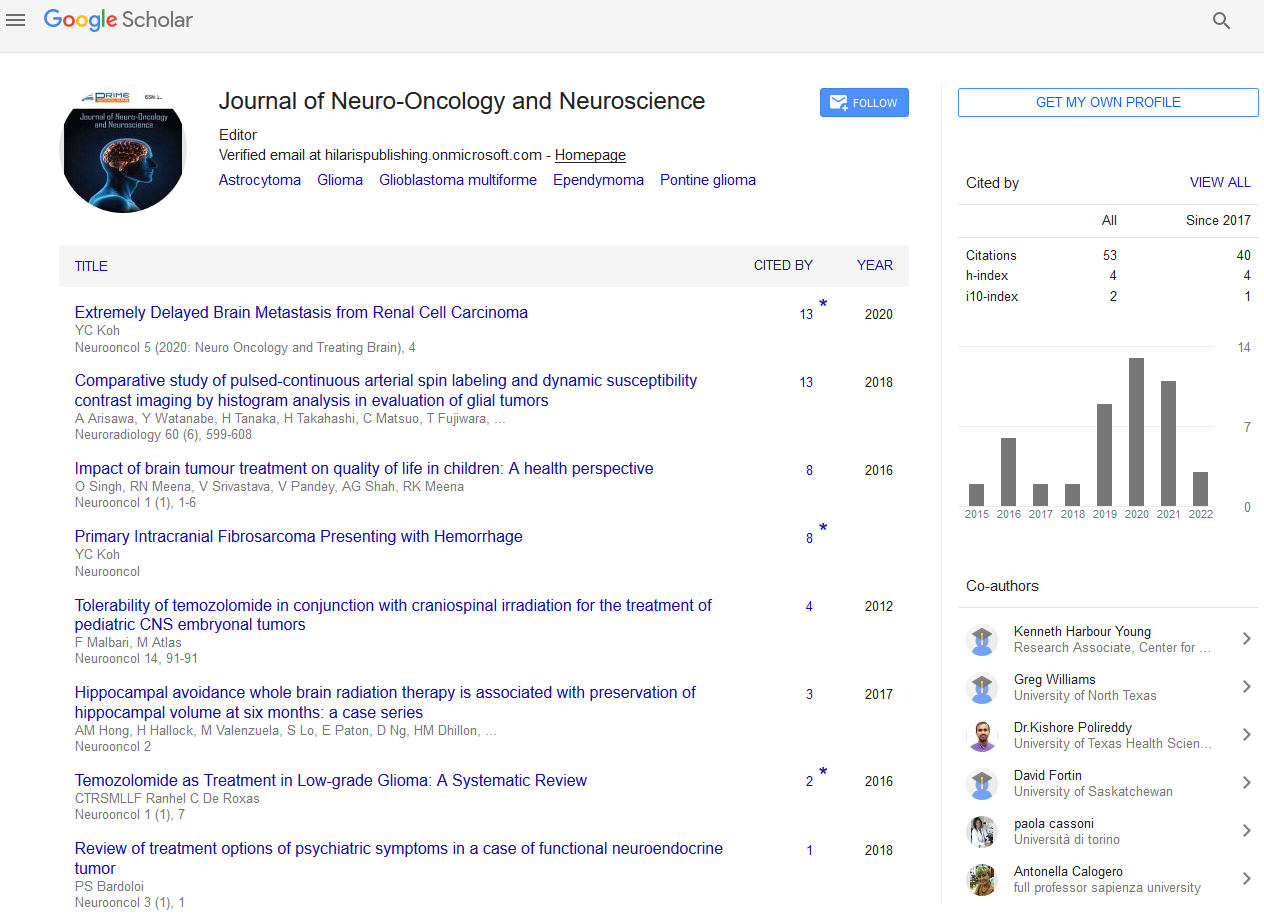Perspective - (2024) Volume 9, Issue 1
Understanding Appendix Cancer: A Rare and Often Misunderstood Disease
Gongya Chen*
Department of Medical Oncology, Shanxi Medical University, China
*Correspondence:
Gongya Chen,
Department of Medical Oncology, Shanxi Medical University,
China,
Email:
Received: 28-Feb-2024, Manuscript No. IPJNO-24-20031;
Editor assigned: 01-Mar-2024, Pre QC No. IPJNO-24-20031 (PQ);
Reviewed: 15-Mar-2024, QC No. IPJNO-24-20031;
Revised: 20-Mar-2024, Manuscript No. IPJNO-24-20031 (R);
Published:
27-Mar-2024, DOI: 10.21767/2572-0376.24.9.1.07
Introduction
Appendix cancer, though rare, presents unique challenges
in diagnosis and treatment due to its subtle symptoms and
varied presentations. This article aims to shed light on this
lesser-known form of cancer, discussing its causes, symptoms,
diagnosis, treatment options, and the importance of early
detection. Appendix cancer originates in the cells of the
appendix, a small pouch located near the junction of the small
and large intestines. While the appendix is often considered a
vestigial organ with no known function, it can develop tumors,
both benign and malignant. The most common type of appendix
cancer is carcinoid tumors, followed by adenocarcinomas.
The exact cause of appendix cancer is unknown, but certain
factors may increase the risk of developing the disease of
appendix cancer can occur at any age but is more common
in adults over the age of 40. Some studies suggest a slightly
higher incidence of appendix cancer in women compared to
men. Individuals with a family history of certain hereditary
conditions, such as Familial Adenomatous Polyposis (FAP) or
Hereditary Nonpolyposis Colorectal Cancer (HNPCC), may have
an increased risk of appendix cancer. A mucocele is a condition
characterized by the accumulation of mucus within the
appendix, which can predispose to the development of tumors.
Description
Appendix cancer often presents with vague symptoms or may
be asymptomatic until it reaches an advanced stage. Common
signs and symptoms may include persistent or crampy
abdominal pain, often localized to the right lower quadrant,
without changes in diet or activity level, palpable lump or
swelling in the abdomen, including nausea, vomiting, and
fever. Diagnosing appendix cancer can be challenging, as the
symptoms may mimic other gastrointestinal conditions. Imaging
studies such as ultrasound, Computed Tomography (CT) scans,
and Magnetic Resonance Imaging (MRI) may help identify
abnormalities in the appendix. However, definitive diagnosis
often requires a surgical procedure called as appendectomy,
in which the appendix is removed and examined under a
microscope for signs of cancer. The treatment approach for
appendix cancer depends on several factors, including the type
and stage of the disease, as well as the patient’s overall health
and preferences. Treatment options may include primary
treatment for early-stage appendix cancer is surgical removal
of the tumor and surrounding tissue. In some cases, a more
extensive procedure, such as a right hemicolectomy, may be
necessary to ensure complete removal of the cancer. Adjuvant
chemotherapy may be recommended after surgery to destroy
any remaining cancer cells and reduce the risk of recurrence.
Chemotherapy regimens for appendix cancer may differ from
those used for other gastrointestinal malignancies.
Conclusion
The prognosis for appendix cancer varies depending on factors
such as the type and stage of the disease, the extent of surgical
resection, and the response to treatment. Generally, earlystage
appendix cancer has a more favorable prognosis, with a
five-year survival rate of around 90%. However, advanced-stage
or metastatic appendix cancer may have a poorer prognosis,
with a lower likelihood of long-term survival. Appendix cancer
remains a relatively rare and understudied form of cancer,
presenting unique challenges in diagnosis and treatment.
Increased awareness among healthcare providers and the
general public is essential for early detection and prompt
intervention. Research efforts aimed at better understanding
the underlying biology of appendix cancer and identifying
novel treatment strategies are crucial for improving outcomes
and quality of life for affected individuals. By working together
to raise awareness, support research initiatives, and provide
comprehensive care, we can make strides in the fight against
this often misunderstood disease.
Citation: Chen G (2024) Understanding Appendix Cancer: A Rare and Often Misunderstood Disease. Neurooncol. 9:07.
Copyright: ©2024 Chen G. This is an open-access article distributed under the terms of the Creative Commons Attribution License, which permits unrestricted use, distribution, and reproduction in any medium, provided the original author and source are credited.

